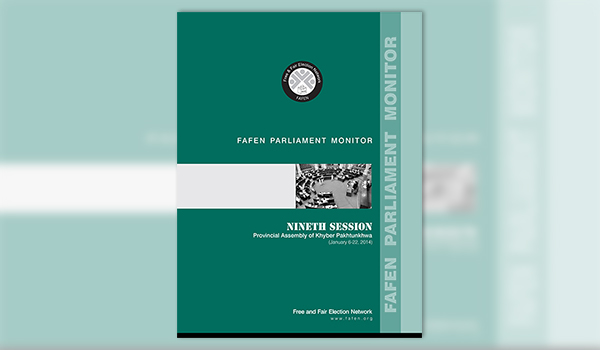ISLAMABAD, January 23, 2014: The ninth session of the Khyber Pakhtunkhwa (KP) Assembly witnessed the passage of five bills including the accountability commission bill and the unanimous adoption of four resolutions while low attendance of law makers was observed throughout the session. The agenda of the session was underscored by the prevailing law and order situation and the pursuit of good governance in the province, says the Free and Fair Election Network (FAFEN) in its report.
The House passed five government bills while six were introduced and sent to the relevant committees. To promote good governance by creating an effective institutional structure for the prevention of corruption the House passed the Ehtesab Commission Bill, 2014. Another bill further amended the Khyber Pakhtunkhwa Ministers (Salaries, Allowances and Privileges) Act, 1975 to augment the perks of the provincial ministers. The House also passed a bill to promote, protect and enforce human rights in the province.
Additionally the Khyber Pakhtunkhwa Higher Education Scholarship Endowment fund Bill, 2014 and the Khyber Pakhtunkhwa Deserving widow and Special Persons Welfare Foundation Bill, 2014 were also passed during the session.
However, the speaker did not granted leave for the introduction of the KP Appointment of Certain Project Employees Bill, 2014 as it was voted against. The bill was the only legislation tabled by the opposition’s side.
The House unanimously adopted four resolutions calling upon the government to initiate dialogue with Saudi government regarding the status and problems faced by Pakistanis residing in the Kingdom, to open historic Balahisar fort for visitors, to ensure supply of daily-use items and movement of passengers and heavy traffic to and from Chitral.
The House adopted another resolution to request the Interior Minister to visit Khyber Pakhtunkhwa and give an in-camera briefing on All Parties Conference (September, 2013 ) whereby the federal government was delegated the task to find out a solution to the terrorism and the law and order crisis and take steps for the restoration of peace.
Against the backdrop of the volatile law and order situation in the province, the assembly held a debate on law and order in the 7th and 8th sittings of the session consuming two hours and forty five minutes of the proceedings. Eleven MPAs shared their views during the debate – two each belonging to PTI, PPPP, PMLN, JUI-F and a single member each of AJIP, QWP-S and ANP.
The session, starting from January 6 till 22, 2014 lasted longer than an average session this parliamentary year, spanning twenty four hours and fourteen minutes. All ten sittings, on average, remained forty eight minutes behind schedule.
The attendance of key members was also low during the sitting as the Leader of the House attended only half of the sittings (26% of the session time) while the Leader of the Opposition abstained from the entire session. The Deputy Speaker presided over 42% (612 minutes) of the proceedings while 32% (469 minutes) were chaired by the Speaker; the remaining time 26% of the session was consumed by eight prayer breaks.
The parliamentary leaders of PPPP, QWP and AJIP were more regular attending nine eight and six sittings respectively; followed by ANP leader (five sittings); JI Leader (three sittings); JUI-F and PML-N leaders (two sittings each). The sole member of APML only attended three sittings.
As the KP Assembly does not make the attendance record of its lawmakers public, the FAFEN observer conducts a headcount of lawmakers at the beginning and end of the proceedings. On average, attendance was low during the session as a little more than half of the lawmakers did not attend the proceedings. Forty-four lawmakers were present at the outset, on average, forty nine at the end while a maximum fifty nine were observed at a time during the proceedings.
The annual report on the Ombudsman Khyber Pakhtunkhwa, 2012; the biannual Monitoring Report on the Implementation of NFC Award, January-June 2012; and the Audit Reports of the Auditor General of Pakistan on Accounts of Government of Khyber Pakhtunkhwa for the Year 2011-12 were laid before the House.
The House took up three adjournment motions for debate; two sponsored by JUI-F while one by QWP lawmakers. The motions called for debate on issues related to communications, rising prices, drone attacks, kidnapping and the general law and order situation in Khyber Pakhtunkhwa.
Lawmakers sought the provincial government’s response on various issues by submitting calling attention notices. Their primary concern of MPAs lay with irregularities in appointments in various organizations followed by matters related to zakaat fund distribution, lack of medical staff in upper areas of Swat and the 2010 floods in the area, provincial assembly employees and education for special children.
To conduct government oversight MPAs submitted 148 starred questions –requiring oral answers – to 27 ministries/ departments. Of these 99 were taken up and answered on the floor while lawmakers asked an additional 40 supplementary questions to get further clarity on the answers.
An ANP MPA moved a motion for leave to propose the amendment in the KP assembly’s rules of procedure and conduct of business 1988. However as the motion was voted against the speaker did not granted leave for its introduction. Thirty-eight lawmakers were agaist the motion while twenty-three voted for it.
Lawmakers spoke on 13 points of order consuming two hours and twelve minutes of the proceedings.
The proceedings broke out twice; once during the first sitting when PPPP MPAs walked out from the entire proceedings over the chair’s alleged indifference while the second time when the entire opposition staged a walkout over the non-referral of a calling attention notice regarding matter of appointment in Municipal Committee Bannu to the relevant standing committee.
For complete report, please click here
This report is based on direct observation of the KP Assembly proceedings conducted by PAIMAN; a member organization of FAFEN. Errors and omissions excepted.









